Top 20+ Must-Try AI Tools for Small Business Owners in 2025
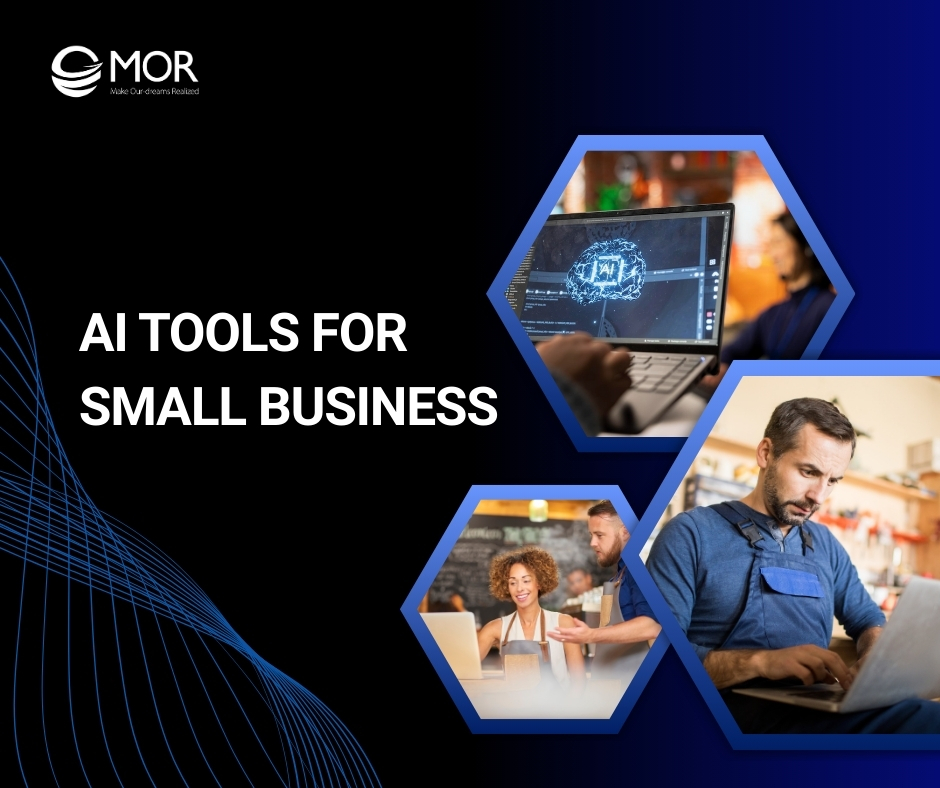
Running a company with limited resources isn’t easy, which is why AI tools for small business are becoming essential. From cutting costs to improving marketing results, these tools give owners the edge they need to compete. This MOR Software’s guide will walk you through the best options to transform how you work in 2025.
What Are The Benefits Of AI Tools For Small Business?
By 2025, 58% of U.S. small businesses say they’re already using generative AI, up from 40% in 2024. This is a clear sign that adoption has tipped from experiment to everyday tool. Reports from PwC highlight that industries already using artificial intelligence are seeing productivity rates more than four times higher than those that do not.
For small companies, this means that AI tools for small business are no longer a luxury. They are practical solutions that cut wasted hours, improve decision-making, and keep budgets under control. McKinsey also estimates that generative AI could add $2.6 to $4.4 trillion in value every year. This explains why small teams under pressure are adopting it quickly.
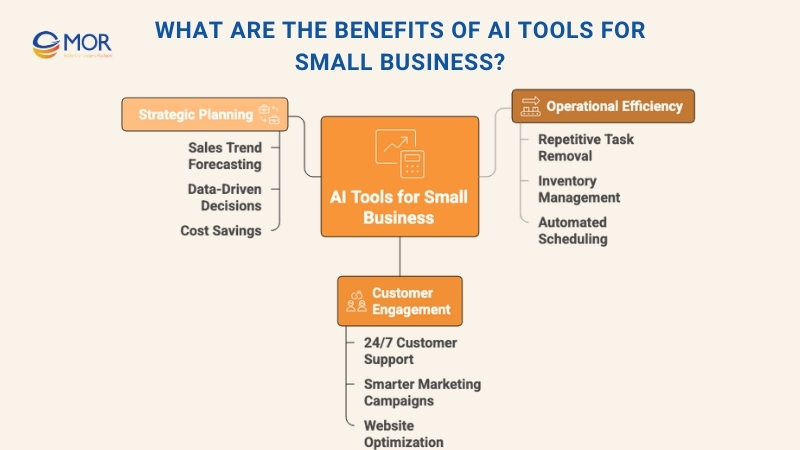
Get Rid Of Repetitive Tasks
One of the biggest time drains for small teams is repetitive work. With AI software for small business, daily tasks like bookkeeping, expense tracking, or invoice sorting can run automatically.
In a UK cross-government trial with 20,000 workers, Microsoft 365 Copilot users reported saving an average of 26 minutes per day on routine admin. This is the time small teams can redirect to customers and cash flow.
Unlike traditional tools, these solutions can scan financial records in seconds, spot spending patterns, and even suggest adjustments that strengthen cash flow. Business owners save time and gain clearer financial visibility without manual effort.
Access 24/7 Customer Support
Customer service no longer needs to stop at closing time. According to Statista, nearly half of American businesses already rely on chatbots for support. With an AI virtual assistant for small business, questions about product details, stock status, or order tracking get answered instantly, even outside working hours.
During the 2024 holiday season, shoppers used AI- and agent-powered chat 42% more than the year before, showing that around-the-clock help is quickly becoming the norm. That constant availability not only improves customer satisfaction but also lightens the load on staff during busy periods.
Run Better, And More, Marketing Campaigns
Unlike traditional platforms, AI for small business marketing goes beyond simple automation. These systems study customer behavior across emails, ads, and past purchases, then adjust campaigns in real time. With that level of learning, businesses can predict what buyers will respond to even before they make a move. For owners looking to stretch budgets, these smarter campaigns bring higher returns without extra effort.
Stop Worrying About Inventory
Inventory mistakes like stockouts and overstocks cost retailers more than $1.7 trillion globally every year, leaving almost no room for error.
Managing inventory is one of the toughest parts of running a small shop. With AI tools for small businesses, owners no longer have to rely on manual counts or guesswork. Real-time monitoring highlights low stock instantly and flags fast-moving products that need attention. McKinsey reports AI-enabled planning can trim inventory 20–30% while improving service levels, turning a chronic headache into a controllable lever
The result is fewer shortages, fewer overstocks, and more confident planning when restocking shelves.
Start Predicting Sales Trends
Forecasting demand has always been a challenge, but AI can now handle it with precision. Through reviewing sales records, seasonality, and spending patterns, AI creates accurate projections for what will sell next. With this type of AI business solution, owners not only automate reorders but also keep accounting clean and forward-looking. It turns reactive management into proactive growth planning.
AI-driven forecasting has been shown to reduce errors by 20–50%, cut lost-sales from stockouts by up to 65%, and lower warehousing costs 5–10%.This turns reactive management into proactive growth planning.
Drive Website Performance
Basic analytics are no longer enough. With best AI tools for small business, websites can be fine-tuned automatically. These systems watch user behavior in real time, identify slow-loading pages, and adjust performance settings instantly.
Even a 0.1-second mobile speed improvement has been linked to approximately 8% conversion lifts for retail sites, and AI can also launch A/B tests without manual setup. This gives business owners a site that constantly improves on its own.
Make Better Decisions
Running a company involves constant choices, and AI makes those calls smarter. Instead of relying on limited reports, AI reviews broad datasets covering customer activity, spending patterns, and wider market shifts. With this type of AI in company solution, small business owners gain clearer guidance on pricing strategies, staffing needs, and long-term growth planning.
Spend Less, Where You Can
For many small teams, budgets are tight. AI systems reduce unnecessary costs by taking over repetitive tasks like shift scheduling, stock monitoring, and expense analysis. In Deloitte’s global intelligent-automation survey, organizations reported (and expect) roughly 31% average cost reductions from automation programs, especially once they move past pilots.
Spotting hidden savings and trimming low-value activities, AI solutions for small business free up funds for priorities that drive real impact. Owners gain efficiency without sacrificing quality.
Smarter Manager Notes
Note-taking no longer has to be scattered across different files. With AI consulting for small businesses, manager notes can be tied directly to employee records, creating a central hub for performance reviews, feedback, and growth tracking. Everything stays in one place, making it easier to spot patterns and keep teams aligned.
Instantly Transcribe Voice Notes
Manual transcription eats up valuable time. With AI-driven tools, spoken notes can be turned into clean text in seconds. In controlled studies, speech input was about 3× faster than typing (with lower error rates), so talk-to-type can keep projects moving without delay.
Features like talk-to-type ensure details are captured without delay, then shared instantly with the team. This is where best AI for small business makes daily communication smoother and faster.
Quick Staff Replacements
Unplanned absences are costly. CDC data pegs U.S. employer losses at about $225.8B annually (≈$1,685 per employee).
Scheduling conflicts or sudden sick days don’t have to disrupt operations. AI-powered systems can check staff availability in real time and recommend the best replacement to step in. With AI marketing tools for small business supporting wider workflows, owners can maintain smooth scheduling and reduce the stress of last-minute changes.
Auto-Build Work Schedules
Creating staff schedules manually can be tedious and error-prone. With AI tools for small business, systems study past shift patterns and generate balanced schedules automatically. Forrester TEI analyses show schedule automation commonly saves managers about 5 hours per week. And data-driven labor scheduling has helped retailers cut store-labor costs by up to ~12% without sacrificing service.
This not only saves hours each week but also adapts quickly when business needs change, keeping operations smooth and employees satisfied.
Top 22 AI Tools For Small Business Owners In 2025
With so many platforms available, choosing the right AI tools for small business can feel overwhelming. We’ve outlined 22 trusted options that deliver real value in 2025.
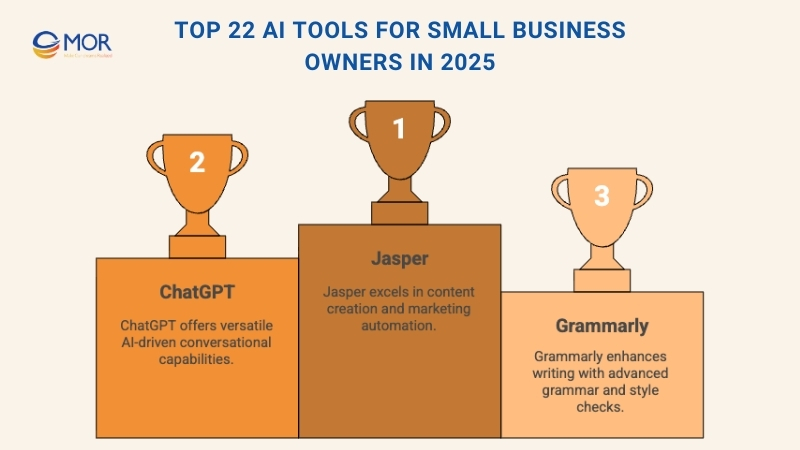
1. Jasper
Key Features
- Creates SEO-focused marketing copy
- Produces plagiarism-free written content
- Supports over 25 global languages
Jasper is one of the most widely used AI tools for small business content marketing. Unlike basic copy generators, it’s designed with SEO in mind, helping businesses rank higher and attract new leads. Users can also train Jasper with company details and brand voice guidelines, ensuring every piece of content stays consistent.
Pricing: Plans begin at $39 per month for individuals, $99 per month for small teams, with custom pricing available for larger organizations.
Benefit: Produces engaging, search-friendly content that can bring more customers to your business.
Shortcoming: The platform has a learning curve, and non-technical users may need time to adapt.
Keep in mind: Always review and edit generated content, as AI writing tools are not perfect and may miss details.
2. ChatGPT (Free)
Key Features
- Generates a wide range of written content and research material
- Interactive and adapts copy based on user feedback
- Goes beyond writing by building schedules, brainstorming, and shaping campaign strategies
ChatGPT is one of the most flexible AI tools for small business owners. It works as both a content generator and an idea partner, capable of remembering feedback and past prompts to improve results over time. This makes it highly effective for businesses that need fast, adaptive support across many tasks.
Benefit: Provides natural, human-like responses, adjusts to your needs, and becomes more accurate the more you use it.
Shortcoming: Can sometimes deliver incorrect or incomplete information if the query is very specific. Always review details before publishing.
Pricing: Free to use with daily limits. ChatGPT Plus is available at $20 per month for faster responses and priority access.
3. Grammarly (Free)
Key Features
- Chrome extension that checks grammar as you type
- Detects tone and formality of your writing
- Integrates with Gmail, Microsoft Word, and other platforms
Grammarly is one of the most widely adopted AI tools for small business communication. It helps teams polish emails, reports, and marketing content with real-time grammar and style checks. The seamless integration across browsers and apps means you don’t need to remember to run separate reviews before sending important messages.
Pricing: The free version covers basic grammar checks. Premium plans start at $12 per month, while business bundles vary depending on team size.
Benefit: Delivers advanced writing support with instant suggestions to refine grammar, punctuation, and overall clarity.
Shortcoming: Can miss context or suggest changes that don’t always fit, so reviewing edits remains important.
4. MarketMuse
Key Features
- Provides detailed insights into how content performs online
- Organizes content into clusters to build SEO authority
- Delivers competitive analysis against similar websites
- Generates content briefs that act as blueprints for articles and web copy
MarketMuse is designed as more than just a writing tool. It serves as a best AI tools for small business content strategy partner by combining SEO research with actionable planning. Unlike generators that only produce text, MarketMuse helps businesses map out topics, refine keyword usage, and strengthen overall authority through structured content clusters.
Pricing: Standard membership starts at $149 per month, $399 per month for small teams, with enterprise pricing available upon request.
Benefit: Provides data-driven guidance to boost search rankings and improve long-term content performance.
Shortcoming: The tool can feel complex at first, and its higher cost may be challenging for smaller budgets.
5. Smartly.io
Key Features
- Social media management platform combining multiple apps in one place
- Runs and tracks ad campaigns across channels with AI-driven insights
- Includes design tools for creating fresh ad creatives
Smartly.io is one of the most versatile AI marketing tools for small business owners who want to simplify social media management. It allows posting across platforms, monitoring ad performance, and generating creative assets without switching between different tools. The platform’s AI insights also guide targeting and optimization to improve results over time.
Pricing: Smartly.io does not list public pricing. Interested businesses can request a demo or consultation for a customized quote.
Benefit: Saves time by automating ads, improving targeting, and supporting creative development in one platform.
Shortcoming: Some features take time to master, and new users may need training to unlock full potential.
6. Ocoya
Key Features
- Creates and schedules social media posts
- Lets users design branded graphics with ease
- Generates AI-driven captions and hashtags
Ocoya is an all-in-one platform that simplifies social media management for growing companies. It enables teams to design posts, test variations, and upload content directly to partnered platforms. As one of the emerging AI solutions for small business, Ocoya brings creation, scheduling, and optimization into a single, easy-to-use hub.
Pricing: Plans start at $15 per month (billed annually) for individual use. Costs rise with additional accounts and users, reaching up to $159 per month.
Benefit: Saves time and resources by consolidating social media planning, posting, and analysis in one place.
Shortcoming: Some features are still under development, so users may find certain functions limited.
7. Flick
Key Features
- Generates AI-powered captions for social media posts
- Suggests fresh content ideas for marketing campaigns
- Includes tools for post creation and scheduling
Flick is designed to make social media marketing easier for small teams. Its standout feature is the caption generator, which produces tailored text to match brand tone and campaign goals. As one of the practical AI for small business tools, Flick also supports scheduling and publishing, and it’s available as a mobile app for managing content on the go.
Pricing: Starter accounts begin at £11 per month (billed annually), with advanced plans going up to £55 per month depending on account size.
Benefit: Enhances social media results by delivering personalized captions and content recommendations.
Shortcoming: While captions can be generated on mobile, uploading visual assets still requires desktop access.
8. Surfer SEO
Key Features
- AI-powered writing assistant that tracks SEO while you draft
- Generates topic ideas instantly by analyzing competitors
- Balances natural tone with keyword integration for better rankings
Surfer SEO is built to help businesses improve online visibility through smarter content creation. It highlights tone of voice, flags duplicate text, and suggests high-performing keywords as you write. For teams focused on building authority, this tool is among the AI software for small business that directly supports website growth and blogging success.
Pricing: Plans start at $69 per month for individual users, with higher-tier or custom packages available for larger companies.
Benefit: Provides precise SEO recommendations that strengthen marketing strategy and improve content quality.
Shortcoming: It doesn’t cover the full spectrum of SEO needs, so additional tools may be required.
9. Frase.io
Key Features
- Builds content briefs using SERP data and competitor insights
- Generates structured outlines in just seconds
- Supports real-time collaboration for team writing projects
Frase.io is a collaborative SEO platform built for content teams. It allows businesses to research keywords, develop outlines, and draft posts together in one workspace. As one of the practical AI tools for small businesses, it shortens the time from research to publication and helps align writing with what search engines are already rewarding.
Pricing: Plans range from $14.99 per month to $114.99 per month, with optional add-ons like unlimited AI support.
Benefit: Supplies data-backed guidance for stronger SEO strategies and more effective content creation.
Shortcoming: While it provides excellent briefs and outlines, it doesn’t cover every SEO activity required for full optimization.
10. Pictory
Key Features
- Converts scripts or articles into videos with stock or AI visuals
- Edits long-form content like webinars into short clips for sharing
- Produces branded videos for email marketing and social platforms
Pictory is an AI-powered video tool that simplifies content creation for small companies. It allows teams to turn text or lengthy recordings into eye-catching videos without hiring a designer. For owners seeking to grow brand presence, it’s one of the best AI for small business tools to repurpose existing content into engaging, shareable formats.
Pricing: Monthly plans start at $19 and can reach $99 depending on usage needs and team size.
Benefit: Makes video creation fast and accessible, even for businesses without in-house design skills.
Shortcoming: The customization options for generated visuals are somewhat limited compared to professional editing software.
11. DALL·E 2
Key Features
- Generates original images and artwork from text prompts
- Expands existing visuals with new creative elements
- Edits uploaded images based on user instructions
DALL·E 2 is a powerful AI image generator that helps businesses create high-quality visuals on demand. From mockups for campaigns to custom graphics for websites, it provides small teams with design support at a fraction of the cost. As one of the growing AI business tools, it gives owners the ability to produce professional-looking visuals without hiring a designer.
Pricing: Credits are used for each image generated, starting at $15 for 115 credits.
Benefit: Enables businesses to impress audiences with unique, eye-catching visuals for marketing and branding.
Shortcoming: Achieving the perfect image may require multiple prompts, which can be tricky for new users.
12. Speechify (Free)
Key Features
- Produces natural-sounding text-to-speech recordings to enhance reading and retention
- Helpful for users with learning challenges, including dyslexia
- Creates professional voiceovers for videos and training materials
Speechify makes it easier to process written content like reports, emails, or meeting notes by converting them into clear audio. With a wide range of voices and accents, it’s also a reliable option for producing voiceovers for marketing videos. As an AI virtual assistant for small business, it improves accessibility, learning, and engagement for both employees and customers.
Pricing: A free plan is available with limited voices and speeds. Premium starts at $11.58 per month, while professional voiceover plans begin at $59 per month, with enterprise-level pricing available.
Benefit: Adds flexibility by making written content more accessible and re-usable across different formats.
Shortcoming: Full commercial rights for voiceovers require a professional subscription, which can increase costs.
13. PhotoRoom (Free)
Key Features
- Quickly removes backgrounds from photos with one click
- Generates new custom backgrounds using AI
- Batch editor allows editing hundreds of photos in seconds
PhotoRoom is an AI-powered photo editor that delivers professional-quality results in minutes. Its tools are especially valuable for online stores looking to polish product listings or social media visuals. As one of the practical AI tools for small business, it helps create consistent, high-quality imagery without relying on expensive design software.
Pricing: Free to use with basic features. Premium plans start at $9.99 per person per month for expanded access.
Benefit: Produces clean, dynamic product images quickly, making e-commerce listings and marketing visuals stand out.
Shortcoming: Some AI-generated edits can look distorted, so reviewing the final output is recommended.
14. Feathery (Free)
Key Features
- Builds professional-looking forms in seconds with AI
- Fully customizable for branding and business needs
- Integrates with tools like HubSpot, Stripe, Shopify, and MailChimp
Feathery makes form creation simple by combining drag-and-drop building with AI-generated templates. Business owners can type in the type of form they need, and the platform creates it instantly. As one of the most practical AI tools for small business, it helps teams design forms that not only look good but also integrate seamlessly with their existing systems.
Pricing: Free for basic use. Premium plans start at $49 per month, depending on features and team size.
Benefit: Generates conversion-ready forms that plug directly into marketing and sales workflows.
Shortcoming: Advanced customization options can feel complex at first, so there may be a learning curve.
15. Intercom
Key Features
- Provides an AI-powered chatbot to answer customer queries 24/7
- Organizes requests and complaints into ticketed workflows
- Suggests professional, polite responses for support teams
Intercom is a customer communication platform built to streamline support. With AI-driven bots, it handles routine queries instantly and organizes tickets so staff can focus on more complex issues. For growing companies, it stands out as one of the most reliable AI tools for small business, ensuring customers always get timely assistance.
Pricing: Starter plans begin at $74 per month. Pro and premium subscriptions are available with custom pricing tailored to business needs.
Benefit: Automates customer service replies and keeps communication running even outside business hours.
Shortcoming: The setup process can be tricky, and some advanced features require higher-tier plans.
16. CrystalKnows (Free)
Key Features
- Delivers personalized communication tips using AI and data
- Reviews outgoing emails and suggests improvements based on recipient profiles
- Builds personality profiles using data from LinkedIn, Facebook, and other sources
CrystalKnows is a unique platform that helps businesses understand prospects before meetings, calls, or emails. By analyzing online data, it predicts the best communication style for stronger engagement and better conversions. As one of the more specialized AI tools for small business, it supports sales, hiring, and relationship-building with actionable insights.
Pricing: Free for basic use. Premium plans start at $49 per month, while business-level subscriptions are priced individually.
Benefit: Offers personality-based insights that can improve sales pitches, hiring decisions, and team alignment.
Shortcoming: Since the tool relies on public data, results can sometimes oversimplify or misrepresent real human behavior.
17. StoryDoc
Key Features
- Builds presentations automatically from your input using AI
- Offers a variety of customizable templates
- Includes an AI writing assistant for generating content
StoryDoc helps businesses create interactive presentations that look polished without hours of manual design. Its AI integration allows users to input information and instantly receive professional slides tailored to their goals. As one of the standout AI tools for small business, it enables teams to pitch ideas, showcase products, or share reports in a more engaging way.
Pricing: Plans start at $30 per month. A professional option is available at $45 per month, with team plans priced based on business needs.
Benefit: Creates sales-ready presentations that capture attention and help businesses stand out in front of clients.
Shortcoming: Missing integrations with major CRM platforms, which makes deployment more manual in some cases.
18. Otter AI (Free)
Key Features
- Automatically joins online meetings and creates transcripts
- Sorts transcripts by topic and highlights key points
- Provides AI-generated answers to questions about meetings
Otter AI is a transcription platform that makes meetings more productive. It not only records and transcribes discussions but also organizes them into searchable notes. For busy teams, it’s one of the AI tools for small business that ensures no detail is missed while saving hours of manual note-taking.
Pricing: Free plan available with core features. Paid plans start at $8 per month for additional functionality.
Benefit: Reduces time spent on manual transcription and makes it easier to review and share meeting outcomes.
Shortcoming: Like many transcription tools, errors can occur, requiring some manual editing for accuracy.
19. Personalize – by Human
Key Features
- Monitors customer behavior and interests through their digital footprint
- Builds tailored marketing campaigns around individual preferences
- Includes email tools for sending personalized campaigns to targeted segments
Personalize is designed to help businesses deliver marketing that feels more individual. By analyzing visitor data and tracking behavior over time, it creates campaigns that match what customers are most interested in. As one of the more advanced AI tools for small business, it enables owners to move beyond generic outreach and connect with customers on a deeper level.
Pricing: Plans start at $69 per month and go up to $219 per month, with higher custom packages available.
Benefit: Improves conversions and revenue by turning visitor insights into highly targeted campaigns.
Shortcoming: Setting up detailed personalized campaigns can take time, especially in the beginning.
20. 6sense (Free)
Key Features
- Tracks prospects through the buying journey and highlights those most likely to convert
- Provides access to one of the largest B2B datasets available
- Integrates with major platforms like HubSpot and Microsoft Dynamics 365
6sense is a revenue intelligence tool that helps businesses focus their marketing spend where it matters most. By predicting which leads are closest to making a purchase, it guides teams toward smarter outreach. For sales-driven companies, it stands out as one of the most effective AI tools for small business, offering data-backed predictions to improve efficiency.
Pricing: Free for all users with upgrade options. Paid plans vary depending on features and company needs.
Benefit: Delivers predictive insights that align sales and marketing efforts for higher conversion rates.
Shortcoming: Integrations can be complex, and setting up the system may require technical expertise.
21. SmartWriter.ai
Key Features
- Generates thousands of personalized emails in minutes with AI
- Pulls data from LinkedIn, blog posts, and recent achievements to craft icebreakers
- Supports sales emails, LinkedIn intros, and cold outreach campaigns
SmartWriter.ai is built to help businesses connect with prospects through highly personalized outreach. By analyzing online activity, it creates email openers and tailored messages that feel more authentic. As one of the standout AI tools for small business, it helps teams scale cold outreach without losing the personal touch.
Pricing: Plans range from $49 per month up to $299 per month, depending on scale and features.
Benefit: Provides data-driven personalization in email communication, helping improve engagement and response rates.
Shortcoming: Some users report challenges uploading contact lists via CSV and limited support when issues arise.
22. Seventh Sense
Key Features
- Crafts highly personalized email campaigns with AI
- Identifies the ideal time and frequency to send messages
- Integrates seamlessly with HubSpot and Marketo
Seventh Sense is an AI-driven email optimization platform built to improve engagement. By analyzing customer data, it determines when recipients are most likely to open and respond, ensuring messages don’t get lost in crowded inboxes. For marketers, it stands out as one of the most effective AI tools for small business communication strategies.
Pricing: Pricing varies depending on the chosen platform. HubSpot users start at $64 per month, while Marketo plans begin at $360 for up to 50,000 leads. Custom pricing is available for larger businesses.
Benefit: Boosts open rates and campaign performance with data-backed delivery times and integrated workflows.
Shortcoming: While support is responsive, some users find the platform complex to navigate initially.
What To Consider When Choosing AI Tools For Small Business
Picking the right platform can make all the difference. Not every solution fits every company, so it’s worth weighing key factors before committing. Below are areas to review, along with questions that help determine if an AI tools for small business solution is truly the right match.
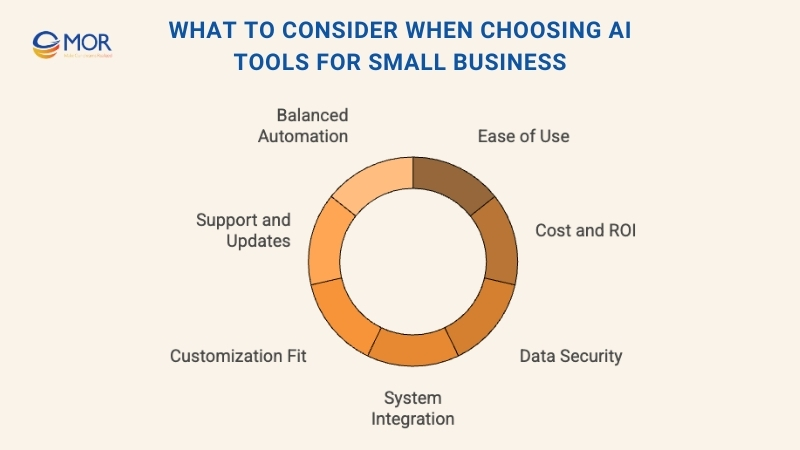
1. Ease Of Use
If a tool feels too complex or demands technical expertise, the value can be lost in extra time or costs.
What to check / ask:
- Does the provider include tutorials, demos, or onboarding support?
- Is the interface simple enough for non-technical users to navigate?
- Can everyday tasks be completed quickly without advanced setup?
- Is there a free version or trial to explore before purchasing?
2. Cost Vs Return On Investment (ROI)
Most platforms come with subscription fees or usage-based pricing. The gains in time, money, or efficiency need to outweigh the spend.
Questions to assess cost & ROI:
- What’s the full cost (subscription, training, integration, ongoing support)?
- Is there a free tier or trial for testing?
- How much will it save by automating routine work or reducing errors?
- How quickly will the business recover the investment?
3. Data Security & Privacy
AI platforms often handle sensitive information, whether customer data or internal records. If this data isn’t protected properly, the risks include legal issues, damaged reputation, and even financial penalties.
Things to verify:
- Does the tool follow national and international data protection laws (GDPR, local privacy rules)?
- How is information encrypted, stored, and restricted by access controls?
- What does the vendor’s privacy policy say about using your data for training or third-party sharing?
- Can you choose to opt out of data being used to improve the model?
- Are safeguards in place to prevent misuse, like prompt injection attacks or unauthorized access?
4. Integration With Existing Systems
A tool that doesn’t fit with your current setup can create more problems than it solves. The best AI tools for small business should connect smoothly with email, CRM, accounting, and inventory platforms already in use.
What to check:
- Does the software offer APIs or prebuilt connectors for common apps?
- Can data be shared automatically without repetitive exports or imports?
- Are there overlaps that might disrupt established workflows?
- Will adoption of the tool simplify processes or add extra steps for your team?
5. Customization & Brand Fit
Your brand’s voice, design, and customer experience are what set you apart. If AI tools for small business only deliver generic copy, visuals, or messaging, you risk losing authenticity. A good tool should adapt to your style, not force you into templates that don’t fit.
Questions to ensure fit:
- Can tone, style, and formatting be customized?
- Does the platform allow you to add brand guidelines or assets?
- Is there an option to review and edit before publishing?
- Does it support localization for different languages and cultural markets?
6. Support & Updates
AI is changing quickly, and outdated software can quickly become a liability. Without strong support and regular updates, tools may fall behind competitors or even introduce security gaps.
What to ask:
- How often does the vendor roll out new features or improvements?
- What support channels are available, live chat, email, phone, or community forums?
- Is there clear documentation, tutorials, or a knowledge base?
- How fast does the provider respond to bug fixes or security updates?
7. Avoid Over-Automation
Automation saves time, but not every task should be handed to software. Some areas still require empathy, creativity, or human judgment. If AI tools for small business are overused, the result can be generic content, poor customer experiences, or preventable mistakes.
What to balance:
- Decide which tasks can run automatically and which still need human review (like customer support or sensitive decisions).
- Always keep people in the loop to check and refine AI outputs.
- Track performance regularly and make adjustments when results fall short.
- Treat automation as support for your team, not a full replacement for the human touch.
How To Start Using AI Tools For Small Business
Looking to bring AI into your daily operations? Here are some practical steps to help you get started with AI tools for small business in a way that feels simple and effective.
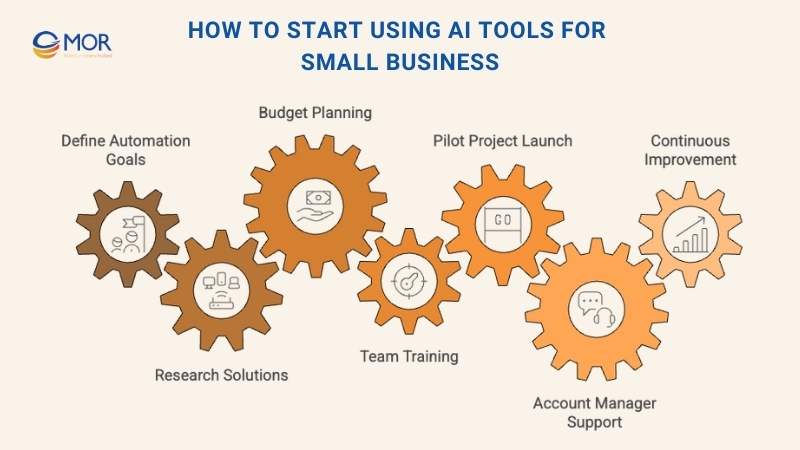
Define What You Want To Automate
Begin by listing repetitive tasks that drain time or create bottlenecks. This use of AI in business might include customer communication, data entry, or inventory tracking. Identify the areas that matter most and focus your automation efforts there first.
Research And Compare Tools
Once priorities are clear, explore available solutions that match those needs. From marketing platforms to scheduling software, the market for AI tools is wide. Concentrate on options designed for small business owners so you get features that are both affordable and practical.
Decide On A Budget
AI software is available at many price points, from free tools to enterprise-level platforms. Establish a budget that fits your goals and ensures your chosen solution delivers measurable value.
Onboard And Train Teams
Once you’ve selected the right platform, roll it out carefully. Provide training so your staff can use it effectively, which ensures adoption and smooth integration into daily operations.
Test With A Pilot Project
Instead of committing right away, start with a small-scale trial. Many AI tools for small business include free versions or trial periods. Running a pilot project helps uncover potential issues, refine workflows, and confirm the tool works before investing fully.
Work With Account Managers
After setup, connect with the account managers from your chosen platform. They can share best practices, highlight underused features, and help tailor the tool to fit your company’s specific workflows.
Keep Improving Over Time
Using AI tools for small business isn’t a one-time project. Review performance regularly and adjust settings or processes as your needs change. This ongoing refinement ensures you continue getting the most value from the technology.
Risks And Pitfalls Of AI Tools For Small Business
AI offers plenty of advantages, but it also comes with challenges. Knowing the risks upfront helps you use AI tools for small business more safely and effectively.
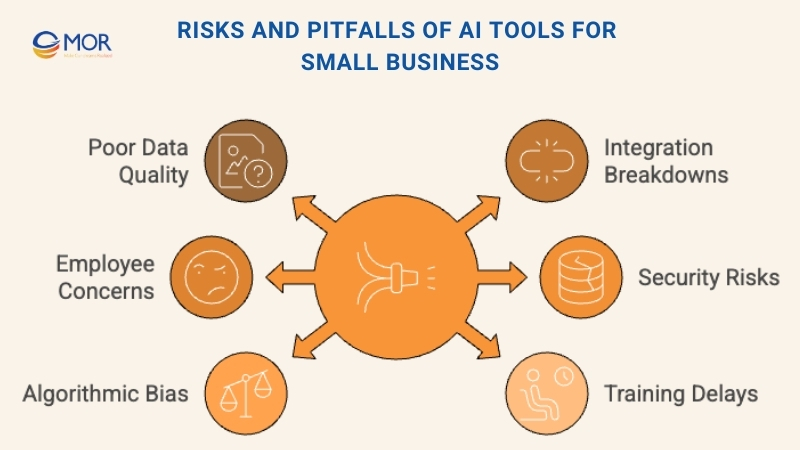
Data Quality Issues
AI decisions depend heavily on the information you provide. If the data is outdated or incomplete, the outcomes may be misleading. Always verify data sources and maintain clean records to avoid costly mistakes.
Integration Breakdowns
Even the best technology can hit roadblocks. Updates or system changes sometimes break integrations, slowing down workflows. Regular monitoring and backup plans are essential to keep operations running smoothly.
Ethical Concerns With Employees
Be upfront about how AI is used in the workplace, especially for monitoring or tracking tasks. Transparency helps maintain trust and keeps team morale strong.
Security And Privacy Risks
Poorly managed platforms can expose sensitive data. Choose AI tools for small business that follow strict privacy regulations and include strong security measures like encryption and access controls.
Algorithmic Bias
AI models can carry over the biases of their developers or datasets. Regularly review results to ensure your tools are producing fair and accurate outputs.
Onboarding And Training Delays
Rolling out new systems often comes with a learning curve. Expect slower adoption at first and provide ongoing training so your team can become confident and effective users over time.
Custom AI Tools For Small Business With MOR Software
Off-the-shelf apps often fall short when workflows get complex. Many small businesses discover that while standard AI tools help with quick wins, they rarely adapt well to unique processes, regulations, or integrations. That’s where MOR Software comes in.
We specialize in building custom AI tools for small business that match specific requirements. Our teams design solutions for mobile, web, and Salesforce environments, supported by a full suite of outsourcing and offshore services. Using Agile and Scrum practices, we deliver software that is scalable, secure, and future-ready.
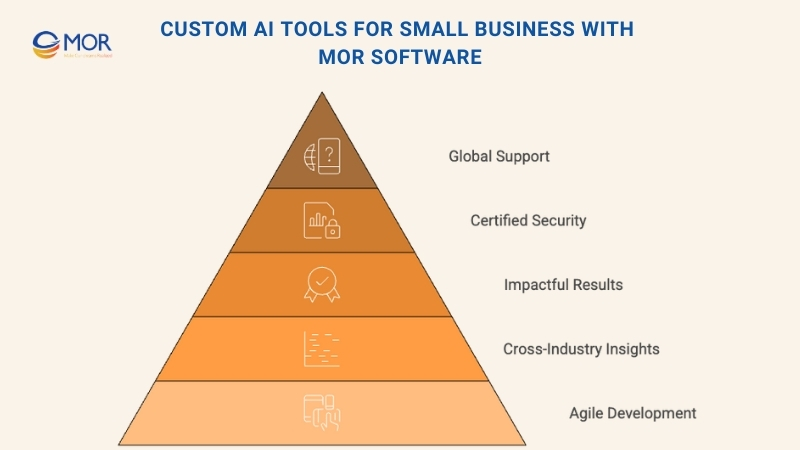
Our experience spans industries like healthcare, finance, retail, and manufacturing. Case studies include:
- Digital News App for Dan Tri reaching over 10 million daily readers worldwide.
- Salesforce + Slack workforce integration that automated time tracking and streamlined attendance management.
- Construction collaboration app enabling real-time reporting, messaging, and task coordination.
With ISO 9001:2015 and ISO 27001:2013 certifications, we guarantee quality and data security from day one. Our engineers are based in Vietnam with offices across Japan, ensuring both cost-effectiveness and a deep understanding of global business culture.
If your small business needs more than a standard subscription tool, MOR Software can design AI solutions tailored to your goals. Contact us to explore how we can help.
Conclusion
AI is no longer optional for growing companies, it’s a practical way to save time, cut costs, and unlock smarter decisions. The right AI tools for small business can reshape how you work in 2025, from marketing to customer service. This MOR Software’s guide has highlighted the best options, but if you need solutions built around your unique workflows, contact us to discuss a tailored approach.
MOR SOFTWARE
Frequently Asked Questions (FAQs)
Which AI tool is best for small business owners?
There isn’t a single “best” AI tool for all small businesses. The right choice depends on what you want to improve. Tools like ChatGPT are great for content creation and brainstorming, Grammarly helps polish communication, and Surfer SEO supports digital marketing. If your goal is automation, platforms like Jasper or Ocoya make campaign management easier.
How can AI be used for small businesses?
AI helps small businesses streamline operations and cut costs. It can predict delivery issues by tracking traffic or flight delays, keep data secure with automated monitoring, and guide smarter decision-making through analytics. Routine tasks like scheduling or invoicing can be automated, while content creation tools support marketing. AI also powers brainstorming sessions, improves teamwork, and strengthens customer support through chatbots and virtual assistants.
What small business can I start with AI?
Popular options include virtual assistant and chatbot services, AI-driven content creation, or marketing agencies built around data automation. Others launch personal productivity tools, workflow automation apps, or platforms for training AI models and labeling data. Startups in smart home management, healthcare tech, and even autonomous transportation are also emerging, showing the wide range of AI-driven business ideas.
How are people using AI to start businesses?
Founders often begin with AI tools that test ideas quickly. By entering a few prompts, they can generate business models, check demand, and validate product-market fit before investing heavily. This rapid validation helps entrepreneurs refine concepts, identify gaps, and create leaner business strategies.
How do I start using AI in my business?
Begin with one or two areas instead of overhauling everything at once. Trial AI solutions for tasks like customer support or marketing to see what delivers value. Comparing different tools allows you to measure accuracy and efficiency while keeping implementation safe and manageable.
Is AI affordable for startups?
Building AI from scratch can be expensive, but startups can lower costs by adopting pre-built tools. Many vendors offer pay-as-you-go models or tiered plans, so businesses can access advanced capabilities without overspending on custom development.
How is AI changing small businesses?
AI is making entrepreneurship more accessible by reducing costs and technical barriers. Non-technical founders can now build apps, test markets, and automate back-office work without needing large budgets or teams. This levels the playing field and enables small businesses to innovate faster.
Rate this article
0
over 5.0 based on 0 reviews
Your rating on this news:
Name
*Email
*Write your comment
*Send your comment
1